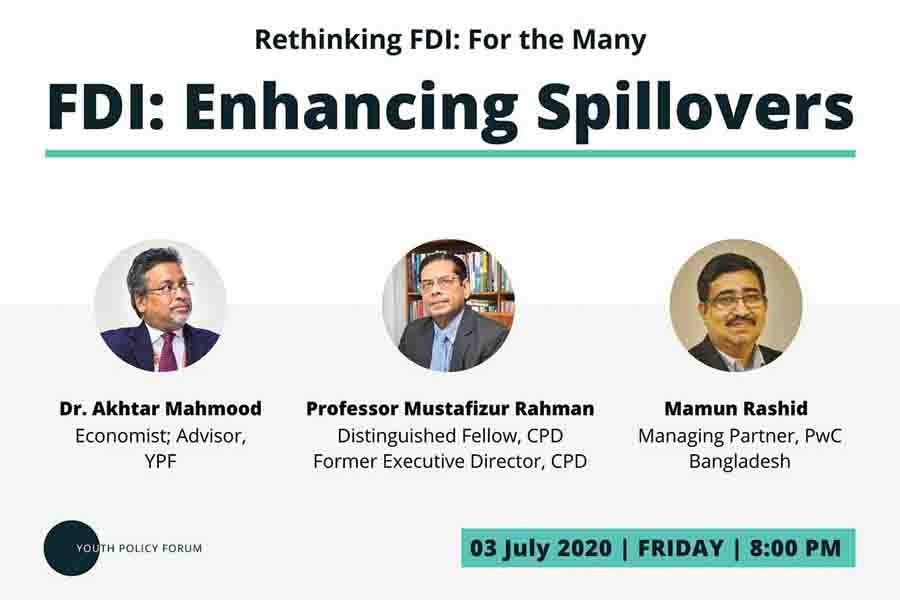Lack of investment diversification among hurdles to boost FDI
Speakers at a webinar opine

Published :
Updated :

Speakers at a webinar identified lack of diversification in investment as a key challenge in boosting foreign direct investment (FDI) in the country.
The speakers stressed on the need for policy measures to diversify investment by identifying three/four key sectors to focus on, and by taking measures to incentivise technological development and positive FDI spillover.
However, they said incentives alone will not guarantee greater FDI inflow and will not ensure positive spillover, if ample transport connectivity, trade connectivity and logistical connectivity are not in place alongside incentives.
The speakers came with the observations at the virtual dialogue organised by Youth Policy Forum (YPF).
YPF recently launched the inaugural episode of its Rethinking FDI dialogue, a series of talks that focus on how to amplify the positive spillover impact of FDI on the economy.
The Financial Express (FE) was media partner of the webinar.
The discussion was led by Dr. Akhtar Mahmood, former World Bank economist, and a member of YPF's advisory panel. The other speakers were Professor Dr. Mustafizur Rahman, Distinguished Fellow and Former Executive Director of Centre for Policy Dialogue (CPD), and Mamun Rashid, Managing Partner of PricewaterhouseCoopers (PwC) Bangladesh.
During the discussion, Dr. Akhtar Mahmood focused on the importance of both inter-sector and intra-sector diversifications, adding how foreign investors with international brand recognition can help create market access for Bangladeshi products by investing in a niche sector of the economy.
He talked about creating a positive spillover impact through backward linkage, i.e., by utilising local firms to supply foreign investors with inputs, instead of these being imported.
"Local SMEs can be utilised to supply these inputs through acquisition of technological skills from the foreign investors, which can create new industries in the process."
He further emphasised the need to insert Bangladeshi producers in various global value chains, stating that learning to manufacture just a few parts of sophisticated electronic gadgets, such as laptops and iPhones, will help them gain access to these value chains.
"Even a small part of this trillion-dollar market will be worth billions of dollars. If we can attract investment in such activities and utilise these technological skills, the revenue thus generated can potentially exceed that of RMG sector," Dr. Mahmood opined.
Professor Mustafizur Rahman stated that incentives alone will not guarantee greater FDI inflow, nor will they ensure positive spillovers.
He also stressed on the importance of transport connectivity, trade connectivity and logistical connectivity alongside incentives.
He mentioned that despite the zero-tariff benefits that Bangladesh enjoys in most markets, the country is still US$19 billion short of the net FDI inflow targeted in the 7th Five Year Plan.
"Thanks to Bangladesh's status as a Least Developed Country (LDC), we have gained access to a vast array of markets in the world. We should be able to take advantage of this."
Professor Rahman stated how Bangladesh has captured only 5.5 per cent of the $700-billion global RMG market, despite being the second largest exporter of these items.
He hoped that if Bangladesh gets the special economic zones (SEZs) up and running, skill development can take place due to backward linkages and associated positive spillover effects.
Mamun Rashid highlighted the importance of political economy of FDI inflow globally.
"Political tension greatly affects the closing of international trade deals," he noted, stating how lack of policy continuity after regime change remains one of the key issues discouraging FDI inflow.
He added that instead of just reading various reports, foreign investors usually rely a lot on the word of mouth of investors, who have already invested in a country, and are discouraged when they hear of any bad experience such investors have to go through.
Professor Rahman concurred, citing the examples of 15-year-old unsettled dispute of KEPZ, and unattained $3.0 billion investment from Tata Company, which have been deterring potential foreign investors from investing in Bangladesh for quite a long time.
Mr. Rashid noted that during the past 30 years, many foreign firms have preferred to buy existing companies - who earlier obtained license to operate due to their political connections, rather than making green-field investments.
He added that this is particularly true in sectors like banking and telecom, where the license to operate is difficult to obtain.
bdsmile@gmail.com


 For all latest news, follow The Financial Express Google News channel.
For all latest news, follow The Financial Express Google News channel.